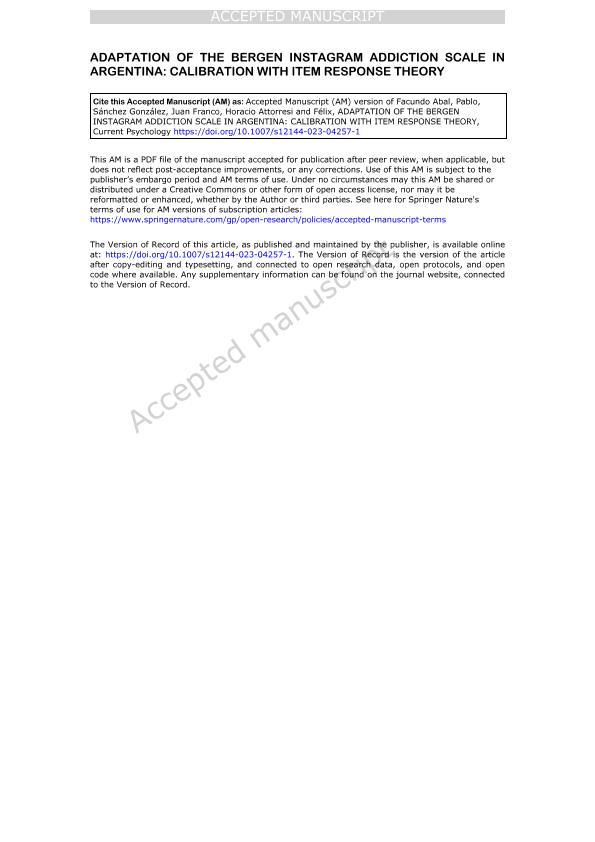Mostrar el registro sencillo del ítem
dc.contributor.author
Abal, Facundo Juan Pablo

dc.contributor.author
Sánchez González, Juan Franco
dc.contributor.author
Attorresi, Horacio Felix

dc.date.available
2023-12-06T17:37:35Z
dc.date.issued
2023-03
dc.identifier.citation
Abal, Facundo Juan Pablo; Sánchez González, Juan Franco; Attorresi, Horacio Felix; Adaptation of the Bergen Instagram addiction scale in Argentina: calibration with item response theory; Springer; Current Psychology; 3-2023; 1-36
dc.identifier.issn
1046-1310
dc.identifier.uri
http://hdl.handle.net/11336/219568
dc.description.abstract
The items of the Bergen Facebook Addiction Scale (Andreassen et al., 2012) were adapted to study the construct in Instagram users. This construct is defined as the tendency to be overly concerned about Instagram, spending so much time and effort on this platform to the point of harming other activities in the individual’s life, interpersonal relationships and psychological well-being. Different Item Response Theory (IRT) models was applied for polytomous items in order to determine which one best explains the responses of those evaluated. The six items were translated into Spanish and evaluated by an expert jury. A total of 754 Instagram users from the Buenos Aires Metropolitan Area took part in the study (65.8% women). An Exploratory Factor Analysis was performed to verify the unidimensional assumption and the assumption of local independence was corroborated. The results referring to the models fit data allows us to provide evidence that the Grades Response Model (GRM) presents the most adequate parametric structure to shape the subject’s responses. All items were adjusted to GRM. Parameters a ranged from 2.02 to 3.45 (Mean = 2.69; SD = 0.49). Parameters b were located within the expected range (-3 to 3) with a minimum θ of -0.51 and a maximum of 2.74. The Ordinal Alpha and Omega were elevated. The Information Function shows a maximum value of 14.26 around a θ of 1.2. This function shows a negative asymmetry, indicating that the scale is more accurate for measuring high levels of the trait.
dc.format
application/pdf
dc.language.iso
eng
dc.publisher
Springer

dc.rights
info:eu-repo/semantics/openAccess
dc.rights.uri
https://creativecommons.org/licenses/by-nc-sa/2.5/ar/
dc.subject
BEHAVIORAL ADDICTION
dc.subject
INSTAGRAM
dc.subject
ITEM RESPONSE THEORY
dc.subject
PSYCHOLOGICAL ASSESSMENT
dc.subject
PSYCHOMETRY
dc.subject
SOCIAL NETWORKING SITES
dc.subject.classification
Psicología

dc.subject.classification
Psicología

dc.subject.classification
CIENCIAS SOCIALES

dc.title
Adaptation of the Bergen Instagram addiction scale in Argentina: calibration with item response theory
dc.type
info:eu-repo/semantics/article
dc.type
info:ar-repo/semantics/artículo
dc.type
info:eu-repo/semantics/publishedVersion
dc.date.updated
2023-12-06T15:03:15Z
dc.identifier.eissn
1936-4733
dc.journal.pagination
1-36
dc.journal.pais
Estados Unidos

dc.description.fil
Fil: Abal, Facundo Juan Pablo. Universidad de Buenos Aires. Facultad de Psicología. Instituto de Investigaciones; Argentina. Consejo Nacional de Investigaciones Científicas y Técnicas; Argentina
dc.description.fil
Fil: Sánchez González, Juan Franco. Universidad de Buenos Aires. Facultad de Psicología. Instituto de Investigaciones; Argentina
dc.description.fil
Fil: Attorresi, Horacio Felix. Universidad de Buenos Aires. Facultad de Psicología. Instituto de Investigaciones; Argentina
dc.journal.title
Current Psychology
dc.relation.alternativeid
info:eu-repo/semantics/altIdentifier/url/https://link.springer.com/article/10.1007/s12144-023-04257-1#citeas
dc.relation.alternativeid
info:eu-repo/semantics/altIdentifier/doi/https://doi.org/10.1007/s12144-023-04257-1
Archivos asociados
